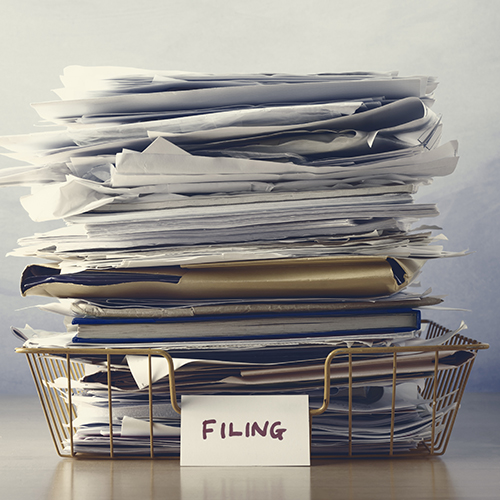
7 simple tips to minimise the risk of a data breach
Adopt these simple data protection practices to be GDPR compliant
Data protection in today’s digital world is crucial. In the workplace it is something that should not be overlooked. The personal data your company processes is valuable, and any attempt to steal this information could be costly to your business. The rules around personal data protection were standardised in Europe in 2018. The General Data Protection Regulations or (GDPR) give businesses guidance on how to keep your business and customer data secure.
There are a number of very simple data protection practices you can adopt to become GDPR compliant. Here are a few simple rules to follow.
1. Appoint a data protection officer
Nominate a member of your team to be the dedicated data protection officer. They will oversee all staff training, all data protection issues and report any data breaches to the Data Protection Commission (DPC). They will also be the point of contact for anyone worried about data protection issues within the workplace.
2. Conduct regular staff training
Staff training is an essential part of keeping your data protected in the workplace. Around 95% of cyber security breaches are caused by human error. Ensure all staff know how to practice good digital security to try and prevent any issues occurring. Simple details such as being able to identify a phishing email, or updating your passwords regularly are common actions you can take to keep information safe. For remote workers, ensure staff are briefed on how to keep business data safe wherever they work.
3. Use a shredder
Shredding documents is an easy way of avoiding physical data being wrongly accessed. Any outdated printed financial or confidential data must be securely shredded. Don’t forget to also shred receipts and post it notes containing information such as phone numbers or email addresses. Old notebooks should be kept for as long as necessary and be shredded as they may also contain sensitive information.
4. Practice good record keeping
Filing documents in an organised way will not only help you access files with ease but will minimise the risk of documents or folders going astray. Have a system for archiving older files so that only the most relevant information is kept in your filing cabinets, and ensure a digital copy is taken before any information is shredded.
5. Adopt a clean desk policy
A clean desk is not only good for productivity but can also prevent a data breach. Ensure that all files are locked away at night. Avoid using bins under desks for another simple way of promoting shredding or paper recycling.
6. Practice good digital awareness
Good digital security is useful not only in the workplace but for your personal data too. Regularly update workplace passwords, encrypt financial documents and be on the lookout for suspicious messages that could be trying to obtain information. Avoid using workplace IT for personal admin such as banking or social media.
7. Recycle responsibly
Remember to dispose of your old IT equipment with care. Hard drives must be degaussed (wiped using magnetic technology) to ensure that no data remains then shredded securely. Don’t forget to carefully dispose of machines such as photocopiers and printers that store digital information on a hard drive. If your office recycles paper, make sure staff know not to put confidential information in the recycle bin and to shred this instead.
We stock a range of products to help you be GDPR compliant, including shredders, digital hardware and secure filing cabinets. For further information on data protection, please see the Data Protection Commission for Ireland.
Latest Articles to hit the hub

Deposit Return Scheme is now live!
When you buy a drink in a container with the Re-turn logo...
07th June 2024
Read More
Why hydration is essential for productivity
Quench your thirst this summer...
15th June 2023
Read More
The best modern desk lamps for your workspace
Lighten up during darker days...
25th October 2022
Read More
Prepare your workplace for the winter
It's never to early to plan ahead...
19th October 2022
Read More
How to create privacy in the open plan office
Find a quiet space to work...
11th October 2022
Read More
How Pukka teas support workplace wellness
A blend to suit every time of day...
27 September 2022
Read More
5 easy ways to keep active at work
For healthier and productive working...
20th September 2022
Read More
Our back to School Stationery ideas
All you need to prepare for September...
16th August 2022
Read More
5 Suprising green facts about paper
How paper production is sustainable...
10th August 2022
Read More
How to make office recycling more successful
Our tips for a sustainable office...
24th July 2022
Read More
How can an air purifier help your hay fever?
Enjoy pollen-free air this summer...
11th July 2022
Read More
Healthy posture for workplace wellness
Ergonomics for comfort and wellbeing...
27th June 2022
Read More
Check out our neat office storage ideas
Practical and useful ideas for your workspace...
12th April 2022
Read More
How we're striving for carbon reduction
Our sustainable business practices...
28th March 2022
Read More
The road to carbon neutral furniture
Promoting more sustainable production...
16th March 2022
Read More
5 Reasons to choose worktables
Discover the most versatile and modern desk ...
8th February 2022
Read More
The best coffee machine for your workplace
Check out our suggestions for the perfect brew...
27th January 2022
Read More
How to ward off those winter germs
Read our simple tips for a healthier season...
20th January 2021
Read More
Why Choose Eco-friendly Stationery?
Discover why eco is the way to go...
13th January 2022
Read More
Merry Christmas and 2021 wrapped up!
Goodbye 2021 and we look forward to 2022...
13th December 2021
Read More
Our top 5 best office shredders
Find the right shredder for your office, large or small...
6th December 2021
Read More
Our favourite office desk accessories
Our top picks to cheer up the dreariest of desktops...
30th November 2021
Read More
How to have a more eco-friendly Christmas
Check out our sustainable gift ideas...
24th November 2021
Read More
What are the benefits of a recliner chair?
Find out the health benefits of relaxing in a recliner...
12th November 2021
Read More
What is the best small office desk?
Find the right desk for even the smallest of spaces...
2nd November 2021
Read More
Be safe and seen with high vis workwear
Discover how to protect yourself in winter...
26th October 2021
Read More
Planning for 2022 with our range of planners
Our reasons to hoose a paper diary or planner...
12th October 2021
Read More
How to find the right home office chair for you
Read our useful suggestions for comfort and ergonomics...
6th October 2021
Read More
What is the best face covering for you?
Discover the right face covering for your requirements...
2nd October 2021
Read More
10 Reasons to support your local supplier
Support your local supplier to help the economy...
27th September 2021
Read More
How can you reduce your carbon footprint?
Looking for ways to become a more sustainable business...?
20th September 2021
Read More
What is the best all in one printer?
Looking for a convenient way to print, copy and scan documents?...
16th September 2021
Read More
What are antimicrobial products?
Antimicrobial products for the workplace to help fight viruses...
7th September 2021
Read More
Outdoor Seating ideas for the Workplace
Many of us have been renovating and reviving our outside spaces...
10th August 2021
Read More
Top tips for an ergonomic desk set up
Avoid strain and injury and become healthier and happier...
21st July 2021
Read More
How does an ergonomic mouse help reduce strain?
Not just for those already experiencing wrist or arm strain...
6th July 2021
Read More
2021 EU Enterprise Awards
Winning the Best Office Supplies Company 2021 & Embracing Change Award for Business Resilience!
22nd June 2021
Read More
What is a Sit Stand Desk & Why
You may have heard of a sit stand desk, but do you know why they are so good for you?
8th June 2021
Read More
10 Tips for Return to the Office
If you haven’t already thought about it, here are 10 things to consider after over a year away
25th May 2021
Read More
Planning for the World of Hybrid Working
Hybrid working offers huge benefits if managed well and can create a happier, healthier workforce


































